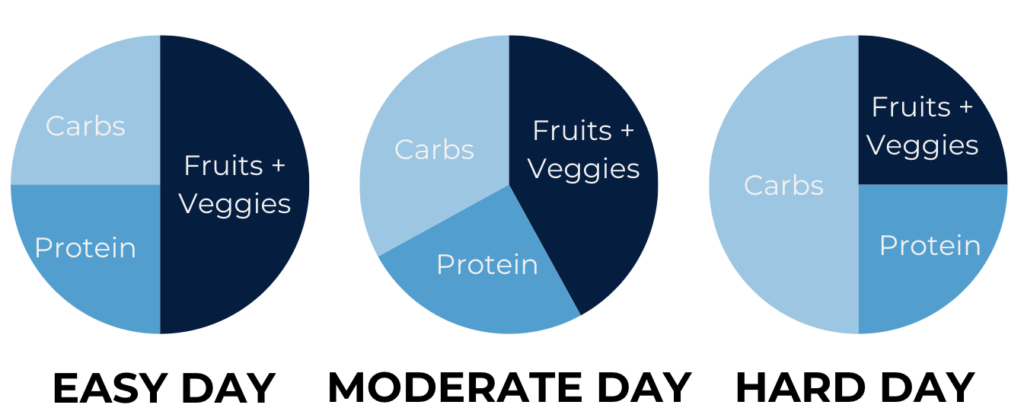If you’ve read Understanding Nutrition for Training followed by Putting Good Nutrition into Practice, you’ve hopefully learned a lot! If you haven’t read the previous articles in this series, we recommend checking those out first.
It can be overwhelming to try to figure out how to incorporate everything the science says about nutrition into your own diet. To help you keep an eye out for red flags, we’ve compiled a list of some of the most common nutrition mistakes that we see in uphill athletes.
Read on for tips to recognize if you fall into one of these categories – and some good suggestions for how to solve some common nutrition problems.
MISTAKE #1: UNDERFUELING
Whether you’re failing to take in enough total calories or carbs or are not eating consistently throughout the day (see previous discussion on within-day energy deficiency), under-fueling can have major detrimental effects on both health and performance metrics.
Under-fueling can be intentional (as in weight loss efforts or eating disorders) or unintentional (e.g., lack of appetite or time to prepare meals). Whether intentional or not, it is critical to increase both the amount that you eat and the proportion of carbs on your plate as your training load ramps up so that your fueling matches up with your training load. You may be able to get away with a mismatch between fueling and training in the short term, but it will catch up with you eventually.
Red flags that you may be under-fueling include frequent injury, long recovery times after training, failure to meet goals or progress despite doing everything “right”, loss of menstrual period, erectile dysfunction, excessive fatigue, and loss of hunger cues.
Solution: Eat more!
How you go about this will depend on your personal situation and causes of your under-fueling, but a good starting point is to ask yourself the following questions:
- Am I going longer than 3-5 hours without eating during the day?
- Do the proportions of food groups in my meals match those shown in the Performance Plates?
If the answer to either of these questions is no, it’s time to make some changes!

MISTAKE #2: Inappropriate Proportions
Our bodies need all three macronutrients in appropriate proportions to thrive. However, in our protein-obsessed society, many athletes worry that they are not meeting their protein needs. While this is a valid concern for many endurance athletes, particularly women, many also fail to meet their carbohydrate needs. Since carbs are the muscles’ preferred source of energy, failing to eat a sufficient amount of carbohydrates can have detrimental effects on performance, as well as general health.
Solution: Use the Performance Plates.
The performance plates will help you estimate the correct proportions of carbs, protein, and fruits and veggies. A simple starting point is to ensure that you have all three macronutrients on your plate for every meal and at least a carb and a protein at each snack. Remember that a meal consisting only of protein and veggies is neither complete nor adequate for athletes.

MISTAKE #3: Skipping Pre-Workout Fuel
Fasted training, while all the rage in the endurance community, comes with serious consequences, including increased risk of injury (this is particularly true for people whose bodies produce estrogen).
These consequences result not only from training on an empty tank but also because many athletes who train fasted end up unintentionally under-fueling as a result. You wouldn’t drive into the mountains without filling up your gas tank, so why are you training without fueling first?
Sometimes, fasted training is not the result of an intentional effort to improve fat adaptation, but rather the result of training early in the morning with little time to prepare food before heading out the door or concerns about gastrointestinal upset from eating too close to a workout.
Solution: Eat a carb-heavy snack before training.
Here are some ideas to put this into practice:
- Opt for an on-the-go snack (such as a granola bar or sports gel) to minimize prep time in the morning.
- Prepare your snack the night before. Try something like overnight oats or rice balls.
- Go to bed earlier. This will make it easier to wake up earlier so you can prepare your pre-workout snack.
- Practice your fueling strategy! The more you practice eating before training, the better your gut will tolerate it.
MISTAKE #4: Fad Diets
What do the ketogenic diet, intermittent fasting, and “clean” eating all have in common? They are not good options for uphill athletes!
The problem with most fad diets is that they result in under-fueling. It is hard to eat enough calories when avoiding all “processed” foods (“clean” eating), when only eating during a 6-8 hour time period (intermittent fasting), or when consuming inadequate carbs (in the case of the keto diet, which emphasizes fats over carbs). In addition to harming health, inadequate calorie or carb intake can prove catastrophic to athletic performance.
Furthermore, following a strict diet complete with rules about what, how much, and when to eat can take a toll on your mental health, with dieting being a major predictor of developing an eating disorder.
At Uphill Athlete, we care both about your performance and helping you meet your athletic goals, AND supporting a healthy body and mind. Dieting is typically not the way to achieve this.
Solution: Ask yourself if your diet is working for you.
If you are following a diet or eating pattern that you can’t see yourself sticking with for the rest of your life, it isn’t sustainable and it isn’t the diet for you!
The guidelines set forth in this article offer a good starting point for implementing a balanced diet. It may be helpful to work with a professional, such as a Registered Dietitian or therapist, to work through any rules that you have around food and to learn how to listen to your body.

MISTAKE #5: Over-Reliance on Supplements
In the digital age, it is easier than ever to stumble across new supplements as it seems everyone online has seen miraculous results from this herb or that supplement. It can be difficult to resist being drawn in by the allure of great results from very little effort. Supplements are indeed appropriate in some cases, but very few have proven effective as ergogenic aids in the endurance world. Still fewer truly offer the health benefits that they claim.
Solution: Consider your supplement use.
If you are already taking supplements, ask yourself the four questions described in our previous article. Do I need it? Is it effective? Is it safe? Does it fit my budget? If any supplement does not receive four resounding “yes” answers, stop taking it.
When you encounter claims about new supplements, think critically. Remember: if it seems too good to be true, it probably is! If you’re not sure if a supplement would benefit you, speak with a Registered Dietitian.
KEY TAKEAWAYS
Nutrition plays a critical role in performance, injury prevention, recovery, and of course overall health. It may provide the extra edge that you are missing for a PR or simply the confidence to run further or climb higher.
The recommendations provided in this article offer a good starting point in considering the adequacy of your overall diet. However, nutrition needs differ for everyone, and it is important to learn what works best for your body.
If you take anything away from this nutrition series, let it be the following:
- Adequate nutrition may be the difference between a PR and a DNF. Nutrition may be what keeps you healthy and free of injury throughout a training block.
- Eat enough total calories and eat a meal or snack containing carbs and protein every 3-5 hours that you’re awake.
Make carbs the centerpiece of all of your meals and snacks. Be sure to increase the proportion of carbs on your plate as your training sessions increase in duration and intensity. - Eat before all training sessions – and eat during all training sessions longer than 60-90 minutes.
- Supplements may serve a purpose but cannot make up for an inadequate diet.
Ready to take your nutrition to the next level? Schedule a Nutrition Consultation or sign up for Nutrition Coaching with Uphill Athlete’s in-house Registered Dietitian.
Reviewed by Chantelle Robitaille, MSc.

